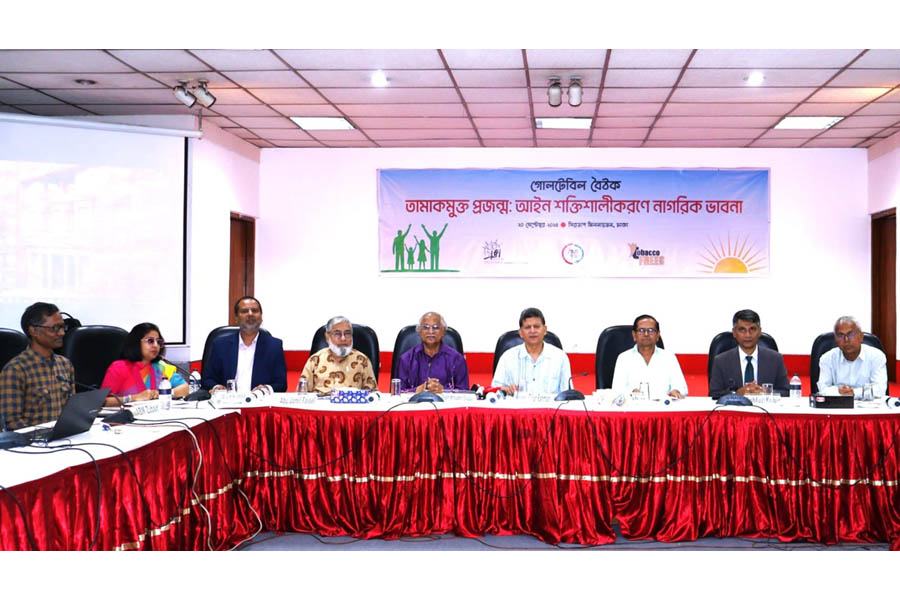
Published :
Updated :

There is no alternative to strengthening tobacco control laws with a view to achieving SDGs, preventing loss of lives and building a tobacco-free generation, experts said at a roundtable in the capital on Saturday.
The roundtable titled "Building a Tobacco-Free Generation: Citizens' Perspectives on Strengthening TC Law", organised jointly by PROGGA (Knowledge for Progress) and Anti-Tobacco Media Alliance (ATMA) was held at CIRDAP Auditorium.
The experts said tobacco works as a major impediment towards achieving Sustainable Development Goals (SDGs) in Bangladesh.
In particular, tobacco frustrates SDG Target 3.4, which is to reduce premature mortality from non-communicable diseases (NCDs) by one-third by 2030, said the speakers.
In Bangladesh, 71% of all deaths are attributed to non-communicable diseases, including cardiovascular diseases and cancer, with tobacco use being a major contributing factor.
On average, tobacco claims the lives of 442 individuals every day, they said.
Speakers also said that tobacco works as a barrier to achieving all major sustainable development goals, such as Good Health, Poverty Reduction, Food Safety and Sustainable Agriculture, Quality Education, Gender Equality, Conservation of Environment and Climate; thus, potentially hindering the realisation of SDGs within 2030.
Dr Hossain Zillur Rahman, a former caretaker government adviser and prominent economist, said, "The harms of tobacco are multifaceted. Since the current government is undertaking reforms in many sectors, the amendment of the tobacco control law would be a signature reform for the government."
Professor Dr Golam Mohiuddin Faruque, President, Bangladesh Cancer Society (BCS), who conducted an experience-sharing session of tobacco-induced cancer victims, said, "We have listened to the woes of the victims. We do not want to hear such dreadful experiences anymore. To safeguard the future generation, the draft amendment of the tobacco control law needs to get the nod as soon as possible."
Dr Abu Jamil Faisel, public health expert and president-elect of the Public Health Association, said, "There is no alternative to strengthening tobacco control laws to deal with the prevalence of NCDs. I urge the government to ensure the quick passage of the amendment."
Dr Mahfuz Kabir, Research Director of Bangladesh Institute of International and Strategic Studies (BIISS), said, "The amendment of the tobacco control law has no relation with potential loss in revenue inflow. To protect public health, the amendment process must be free from tobacco industry interference."
Professor Dr Anupam Hossain, a Public health expert and international sports development consultant, said, "E-cigarettes and vaping are equally harmful to traditional tobacco products. So, these products must be banned at all costs."
Among the discussants were Mortuza Haider Liton, Convenor of ATMA; AMB Zubair, Executive Director, PROGGA and representatives of a number of anti-tobacco organisations. Nadira Kiron, Co-convener of ATMA, hosted the event, whereas Hasan Shahriar, Head of Programs, PROGGA, presented the key points.


 For all latest news, follow The Financial Express Google News channel.
For all latest news, follow The Financial Express Google News channel.